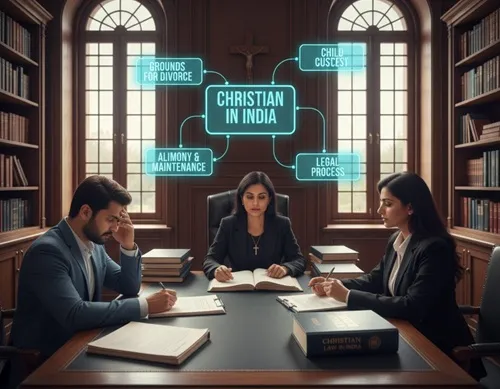
The Indian Divorce Act, 1869, governs divorce, judicial separation, alimony, and child custody for Christians in India. It applies if one or both spouses are Christians and married under Christian rites. The Act ensures fair and gender-neutral remedies, especially after the 2001 amendments.
Key Highlights
- Grounds for divorce: adultery, cruelty, desertion (2+ years), mental illness, conversion, or bigamy.
- Both husband and wife can file for divorce.
- Provides alimony/maintenance and child custody provisions.
- Judicial separation allows living separately without terminating the marriage.
- Mutual consent divorce is allowed with a 6-month cooling-off period (waivable in some cases).
State-Wise Practical Notes
| State/UT | Divorce Filing | Family Court Presence | Special Notes |
|---|---|---|---|
| Maharashtra | Mumbai, Pune, Nagpur | Family Courts in major districts | Legal aid available in urban centres |
| Kerala | Thiruvananthapuram, Kochi | Family Courts in district HQ | Mediation encouraged |
| Tamil Nadu | Chennai, Coimbatore | Family Courts present | Counselling services optional |
| Karnataka | Bengaluru, Mysuru | Family Courts at district level | Women-friendly help desks |
| Uttar Pradesh | Lucknow, Kanpur | Family Courts | Court-appointed advocates available |
| West Bengal | Kolkata, Siliguri | Family Courts | Legal awareness programs in urban zones |
| Telangana | Hyderabad | Family Courts | Legal aid available |
| Rajasthan | Jaipur, Udaipur | Family Courts | District legal aid services |
Practical Tips
- Keep the marriage certificate and documents ready before filing.
- Collect evidence (messages, witnesses) for contested cases.
- Use mediation/counselling to speed up mutual consent cases.
- Hire an experienced family law lawyer for contested matters.
- Women can approach the State Legal Services Authority for guidance and protection.
FAQs – Christian Divorce
-
1. Who can file for divorce under this Act?
-
Any Christian or person married under Christian rites in India.
-
2. Can both men and women file for divorce?
-
Yes, the law has been gender-neutral since 2001.
-
3. What are valid grounds for divorce?
-
- Adultery
- Cruelty
- Desertion for 2+ years
- Mental illness
- Conversion to another religion
- Bigamy
-
4. Is mutual consent divorce allowed?
-
Yes, both spouses can jointly apply. Cooling-off period is 6 months.
-
5. What is judicial separation?
-
A court order allowing spouses to live separately without ending the marriage.
-
6. Can a Christian woman seek divorce for cruelty or adultery?
-
Yes, after the 2001 amendment, women have equal rights.
-
7. Can remarriage happen after divorce?
-
Yes, after the court grants a final divorce. Church rules may vary.
-
8. Where is a divorce case filed?
-
Family Court or District Court of residence or last marital home.
-
9. How long does a Christian divorce take?
-
- Mutual consent: 6 months–1 year
- Contested: 1–3 years, depending on evidence and complexity
-
10. What happens to children?
-
Court decides custody, visitation, and maintenance based on the child's best interest.
-
11. Is alimony or maintenance granted?
-
Yes, courts can order monthly support or a lump sum for dependent spouses.
-
12. Can both parties share the same lawyer?
-
No, each must have separate legal representation.
-
13. Can only one partner file for divorce?
-
Yes, contested divorce is allowed, but valid grounds must be proven.
-
14. Does adultery need evidence?
-
Yes, proof like messages, photos, or witness testimony is needed.
-
15. Is counselling required?
-
Courts may recommend mediation or counselling, especially if children are involved.
-
16. Does the Act apply to marriages outside India?
-
Only if the marriage was solemnised in India or one spouse resides in India.
-
17. Has the Act been gender-biased?
-
Initially yes, but 2001 amendments made it fair for both spouses.
Add new comment